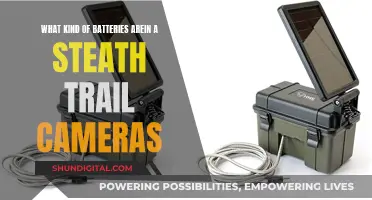
Camera batteries are essential for photographers, but they can be tricky to maintain, especially when it comes to long-term storage. Proper storage techniques are crucial to ensure that your camera batteries remain functional and retain their charge effectively. This is especially important if you own older cameras that are becoming harder to find batteries for. So, how should you store camera batteries?
What You'll Learn

Store in a cool, dry place
Storing your camera batteries in a cool, dry place is essential to ensure their longevity and safe usage. By keeping them in a controlled environment, you can maintain the health of your batteries and get the most out of your device.
Room temperature is generally considered the optimal range for storing camera batteries. Avoid extreme temperatures, as heat can cause damage to the battery cells and reduce performance. Intense heat can cause the fluid in the battery to evaporate, leading to battery failure. Cold temperatures can also be detrimental, as they can form condensation and erode batteries over time. Therefore, it is best to avoid storing your camera batteries in places like attics, garages, or refrigerators.
The storage location should also be dry to prevent moisture from affecting the batteries. Moisture can lead to corrosion and leakage, which can be hazardous and damage your batteries. Keep your batteries away from direct sunlight or heat sources, as sunlight can heat up the batteries and cause potential harm.
Additionally, ensure that your storage area is free from metal objects or other batteries. Metal objects can cause a short circuit if they come into contact with the battery terminals. Similarly, mixing old and new batteries or batteries of different types can lead to reduced performance or even damage the cells.
By following these guidelines and storing your camera batteries in a cool, dry place, you can extend their lifespan and ensure they are always ready for use when you need them.
The Evolution of Wyze Cameras: Battery or Plug-In?
You may want to see also

Don't let metal touch the terminals
When storing camera batteries, it is important to take several precautions to ensure the batteries remain functional and do not cause harm. One crucial precaution is to prevent metal objects from touching the battery terminals.
Battery terminals are the two ends of a battery, labelled with a plus (the cathode) and a minus (the anode) sign. They are the points through which electric current flows when the battery is in use. Allowing metal objects to touch both terminals simultaneously can cause a short circuit, which can be highly damaging to the battery and may even lead to a sudden burst of heat. This occurs because the metal object provides a direct path for the electric current to flow between the terminals, bypassing the intended circuit. As a result, the battery quickly drains, and in rare cases, the sudden release of energy can lead to a rapid increase in temperature.
To avoid this issue, always ensure that metal objects are kept away from the battery terminals during storage. Cover the terminals with a terminal cover or a piece of adhesive tape to provide a protective barrier. This simple step will prevent accidental contact and significantly reduce the risk of short circuits. It is also good practice to store batteries in a dry place, as moisture can lower the resistance of the battery, making it more susceptible to short circuits.
Additionally, it is worth noting that the battery's label also serves a functional purpose beyond providing information. The label exposes only the necessary portions of the positive and negative ends for electrical contact while protecting the rest of the battery from potential short circuits. Therefore, it is essential to never remove the label from a battery. If the label accidentally comes off, place the battery in a plastic bag and dispose of it responsibly at a designated collection point.
By following these guidelines and taking extra care with the battery terminals, you can effectively store your camera batteries and maintain their functionality for an extended period.
Third-Party Batteries: Safe Power for Your Camera?
You may want to see also

Remove from the camera when not in use
It is advisable to remove batteries from cameras when they are not in use for a prolonged period of time, especially if it will be unused for over a year. This is because the camera consumes battery power even when it is off, slowly draining the battery. If the camera is not used for a long time, the battery may be completely drained, which can damage the battery and render it unusable.
Additionally, removing the battery from the camera when not in use can help prolong the life of the camera itself. This is because batteries can leak, causing permanent damage to the camera body.
However, the decision to remove or keep the battery depends on the type of camera and battery. Some cameras, such as point-and-shoot cameras, are more susceptible to damage from leaking batteries than others. Similarly, lithium-ion batteries should never be stored discharged, as this can kill them. In contrast, alkaline batteries are less likely to leak and cause damage.
If you decide to keep the battery in the camera, it is a good idea to recharge the battery at least once a month to prevent it from completely draining.
Tasco Trail Camera: Loading Batteries for Optimum Performance
You may want to see also

Keep at a 50% charge
Keeping your camera batteries at a 50% charge is a great way to ensure they last longer. This is because a 50% charge keeps the battery at a low stress level and reduces the chances of overcharging or undercharging, both of which can shorten the battery's lifespan.
To achieve this, you can charge your batteries to full and then use them until they reach the halfway mark, before storing them in a cool, dry place. It is also good practice to clean the battery terminals with a dry cloth to ensure no dirt or residue builds up, which could impact performance.
If you are storing your batteries for an extended period, it is recommended to check on them every three months, as they will slowly lose their charge over time. When you check them, make sure they are still above 40% charged; if they have dropped below this, you should recharge them to 50%.
Additionally, it is important to note that you should never allow metal objects to touch the battery terminals, as this can cause a short circuit and damage the battery. Always use the terminal cover when the battery is not in use, and try to keep the batteries in a dry place with temperatures no higher than 30°C (86°F).
By following these steps, you can effectively store your camera batteries at a 50% charge, maximising their lifespan and ensuring they are ready for use when you need them.
Charging the JVC Everio: A Step-by-Step Guide
You may want to see also

Warm them slowly if they're cold
If your camera batteries are cold, it's important to warm them up slowly. Avoid pouring hot water on the battery, as this can be dangerous. Instead, consider purchasing a battery warmer, which is a heating pad that wraps around your battery. Alternatively, you can bring the battery inside to warm it up, but this may take up to two hours. If you need to warm up the battery more quickly, use a hairdryer on a low setting. Be sure to keep the hairdryer a safe distance from the battery to avoid any potential fire hazards.
If you're trying to start a car with a cold battery, there are a few things you can do. First, try to minimise electrical drain by shutting the car doors and turning off all accessories, including the heater, radio, and lights. Then, try starting the car and if it doesn't work, wait a couple of minutes before trying again. You can also try using the headlights for a short period to warm up the battery. If the battery is completely dead, you may need to jump-start it using jumper cables and another running car.
Charging the Kitmesh Camera: A Quick Guide
You may want to see also
Frequently asked questions
Store your batteries in a cool, dry place, at a temperature no higher than 30°C (86°F). Keep them separate from the camera, and make sure they're at least half charged.
Some people recommend storing camera batteries in the refrigerator. However, it's important not to expose batteries to extremely cold temperatures, as this can damage them.
You should charge and discharge your camera batteries at least once a year. Some sources recommend doing this more frequently, and one source suggests charging them periodically, such as once a month.
Make sure no metal objects touch the terminals, as this can cause a short circuit. Keep a few spare batteries, and always carry some with you when travelling or shooting on location.







